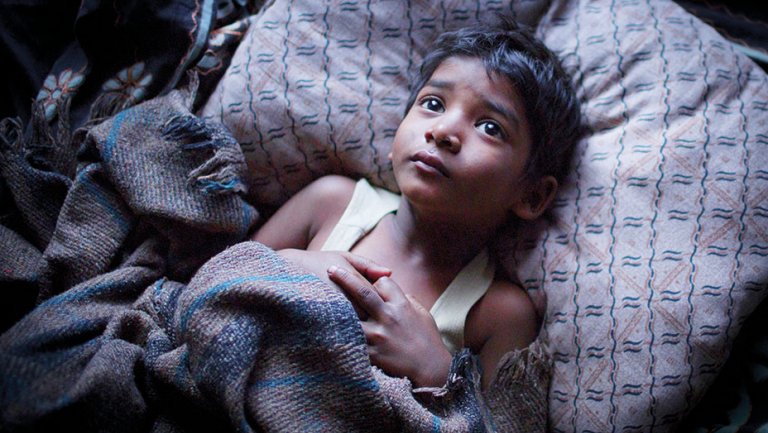Directed by Garth Davis | Written by Luke Davies, adapting the book A Long Way Home by Saroo Brierley | 118 min
It’s 1986, and Saroo (Sunny Pawar) is a five-year-old Indian boy living in a rural village with his older brother, Guddu (Abhishek Bharate), mother Kamla (Priyanka Bose), and baby sister. Kamla barely ekes out a living as a labourer and Guddu and Saroo steal coal from freight trains and sell it. On an evening out in the rail yards, Guddu and Saroo are separated—Saroo falls asleep on a train and wakes up miles away, alone, eventually arriving in Calcutta, where he’s lost in the grim subterranean hallways of a train hub amongst other homeless children. How he survives and is adopted by an Australian couple, Sue and John Brierley (Nicole Kidman and David Wenham), is a surprising and unlikely story the film best tells.
Years later, the grown-up Saroo (Dev Patel, who’s been working out) is restless—at odds with his brother Mantosh (Divian Ladwa) who was adopted a year after he was—and carries around the feeling he’ll never really know himself unless he finds his family in India. It sours his relationship with Lucy (Rooney Mara), a fellow student at hotel management school. Concerned he’ll hurt his adoptive mother, he secretly uses Google Earth to trace his progress backwards along rail lines, trying to find his birthplace.
Lion does a good, deliberate job setting the stage for its biopic drama, one that manages, through image and sound, to avoid most of the genre cliches. Those first 25 minutes or so as tiny Saroo desperately searches through a bleak and uncaring urban landscape is totally compelling, my favourite part of the film.
The second act is a bit more wobbly, with a few on-the-nose bits of dialogue and a short shrift with some of the supporting cast. Mantosh, for example, is a plot device, not a character, and though Mara is very good, you wish her romance with Patel was actually given a chance to manifest before hitting the rocks. The rest of the cast is solid: Kidman reminds us what she can do when playing an ordinary human being and Sunny Pawar is the most potent child actor to come along since Jacob Tremblay.
What works best is a grace in the visuals, haunting shots of the train crossing seemingly endless Indian countryside, reflecting the Saroo’s lived experience, or resting on the actors’ faces, the evocative score helping to carry much of the emotion. The film explores the idea of home and how much it’s tied to our identity as human beings, and it doesn’t soften the poverty it depicts, while finding a kind of beauty in the humanity. That the story is based on actual lives and actual events gives it an earned poignancy. It’s a weepie, but a quality one.









